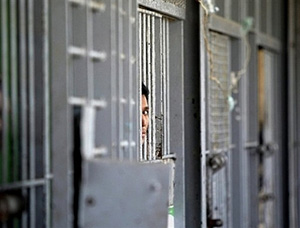
|  |  |  News Around the Republic of Mexico | August 2008 News Around the Republic of Mexico | August 2008  
Mexican Drug Gang Turns to Kidnapping in U.S.
 Lizbeth Diaz - Reuters Lizbeth Diaz - Reuters
go to original


| | File photo shows a man known as "Soldier", sentenced to 30 years and 3 months in prison for kidnapping and criminal association, peeps through the bars of a cell in Mexico City. Mexican authorities on Monday launched an anti-kidnapping squad amid plans for countrywide protests against violence and kidnappings following the high-profile abduction and killing of a teenage boy. (AFP/Jorge Uzon) | | |
Tijuana, Mexico - American businesswoman Veronica was stepping out of her car in California when two men forced her into the passenger seat at gunpoint, pushed her teenage daughter into the back and drove them into Mexico.

Taking advantage of lax Mexican security at the San Diego border, and with U.S. authorities focused mainly on those entering the United States, the kidnappers took the two women to Tijuana in January and held them for a month before their family paid a $100,000 ransom.

"We got an automatic green light to go through Mexican customs and then we were blindfolded and taken to a house in Tijuana. They held a pistol to my stomach all the time we were in the car," said Veronica, who declined to give her surname.

An unintended consequence of Mexican efforts to weaken drug gangs, drug traffickers around Tijuana are turning to abducting U.S. citizens and residents in southern California and holding them in Mexico as a new way to get funds, U.S. and Mexican authorities say.

Mexican intelligence officials say Veronica is one of around 30 Americans abducted in southern California and taken to Tijuana since last November. Many of the victims are of Hispanic origin and hold double nationality.

"Transnational kidnappings are a new way of operating for these criminal groups, mainly in California, and so we are seeking collaboration with the United States," Baja California state Attorney General Rommel Moreno told Reuters.

The FBI in San Diego says it is investigating 16 cases of U.S. residents kidnapped and held in Tijuana between October last year and May, including some who were abducted in San Diego County.

Wealthy Mexicans have fled Tijuana since 2006 to live in San Diego's plush suburbs and escape violence that has engulfed the city as drug gangs kill rivals, police and even children.

More than 200 people have been kidnapped in Baja California state so far this year, a third more than in all of 2007, according to Mexican kidnap victims' association Esperanza.

Mexicans are outraged at the recent kidnapping and murder of the 14-year-old son of a wealthy businessman in Mexico City.

Kidnapping has for long been a major security problem in Mexico but the cross-border seizures are relatively new.

In June, the FBI arrested the leader of a Mexican kidnapping and drug trafficking ring in San Diego. Security firms in San Diego County who offer protection, consultancy and technology to avoid kidnappings say business is growing.

CALIFORNIA AND TEXAS

"We have seen an increase in the number of kidnappings of U.S. citizens in Tijuana, including cross-border abductions," said FBI special agent Darrell Foxworth in San Diego.

Several Americans have also been kidnapped in Texas this year and held for ransom in Mexico, the FBI said.

Mexican officials say the Arellano Felix drug cartel in Tijuana is turning more to kidnapping after being weakened by battles with rival drug gangs and the arrest of its top leaders.

Mexican President Felipe Calderon has made the drugs war one of his main policies since taking office in late 2006. But the violence has intensified with around 2,000 people murdered so far this year and even the weakened gangs are still active.

"The break-up of the Arellano Felix organization has not been as complete as we would have wished ... they have moved into other activities such as kidnapping," Mexico's Attorney General Eduardo Medina Mora said in a recent trip to Tijuana.

Police suspect the Arellano Felix clan is conducting cross-border abductions because so many wealthy Mexicans have left Tijuana and those who remain have heavy security.

Most of the abductions are done in daylight, with the kidnappers using the victim's car and threatening the victim with a hidden pistol, Mexican police and Esperanza say.

A spokesman for U.S. Customs and Border Protection in San Diego said the agency does not have the resources to carry out southbound checks, although agents do make periodic, surprise revisions.

Mexican customs officials only check about 5 percent of vehicles entering by road into Tijuana and blame a lack of funds for the lightly-manned border posts, said a Baja California state official, who declined to be named.

(Writing and additional reporting by Robin Emmott; Editing by Kieran Murray) |

 |
|  |



